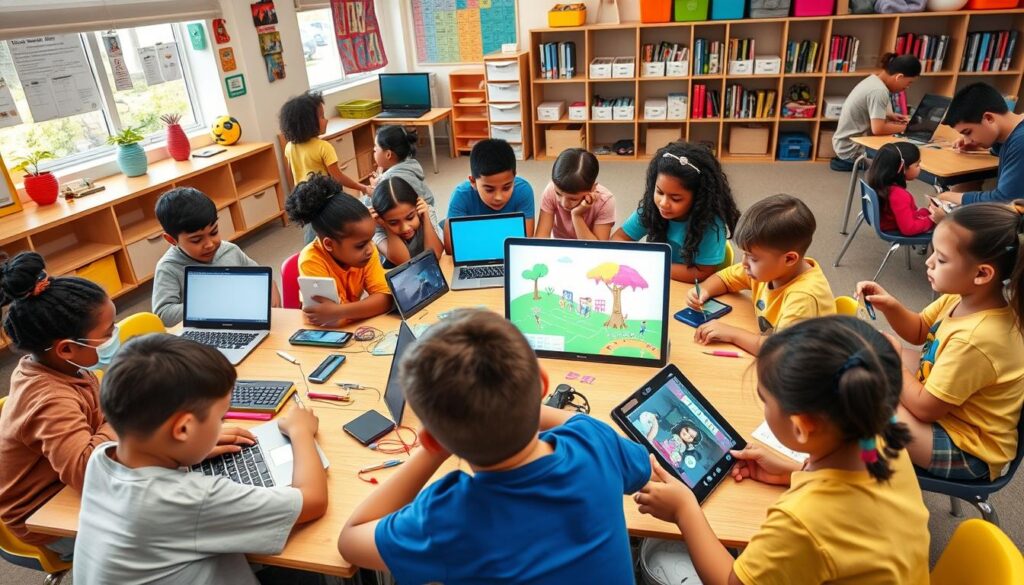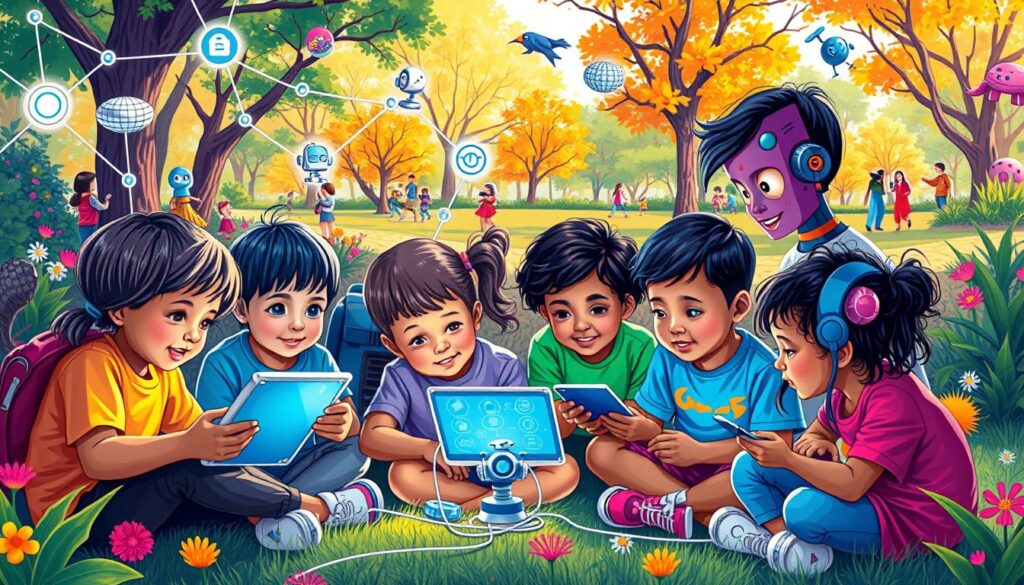Empowering the Next Generation: Raising Confident Kids in a Digital World

Navigating parenthood in the digital age can feel like a rollercoaster ride. Our kids are growing up in a world where screens are omnipresent, and it’s easy to feel overwhelmed by the challenges this poses.
But here’s the empowering truth: we have the power to raise confident, resilient kids who thrive in this digital landscape. It’s about embracing technology’s potential while equipping our children with the tools they need to navigate it wisely.

Let’s explore practical strategies to nurture their self-esteem, protect their mental health, and empower them to be their best selves, online and off.
Understanding the Digital Landscape
The digital world is a big part of our kids’ lives. It’s full of chances for learning, talking, and fun. But, it also has dangers like cyberbullying, bad content, predators, and privacy issues.
Risks and Challenges Faced by Children Online
Cyberbullying is a big worry. Kids can face endless mean words and actions online. This can hurt their feelings and affect their minds for a long time.
They might also see things they shouldn’t, like violence or bad words. This can harm how they grow up and feel.
Online predators are another danger. They can hide and trick kids online. This makes kids feel scared and unsafe.
Also, kids’ personal info can be shared without their okay. This can lead to bad things happening to them.
There are also digital divides. Some kids have more access to tech and know how to use it better. This makes things unfair for others.
We need to know about these dangers to keep our kids safe online. By facing these issues, we can help our kids enjoy the digital world safely.
“The digital world is a double-edged sword, giving kids amazing chances but also big dangers. It’s our job as parents, teachers, and leaders to help them. We must teach them how to stay safe and strong online.”
The Importance of Teaching Online Safety
In today’s world, teaching kids about online safety is key. We need to teach them digital literacy, critical thinking, and responsible digital citizenship. This way, they can safely and confidently use the internet.
The internet has changed a lot. Games and social media today are very different from the old arcade games. This change brings new challenges and risks. So, teaching online safety is very important.
We can teach kids about online privacy and how to spot fake news. We can also teach them to manage their online presence. This helps keep their personal info safe and promotes good online behavior.
It’s also key to teach kids to think critically online. We should encourage them to question what they see online and check facts before sharing. This helps stop the spread of false information and makes them smart online users.
Children’s brains are not fully grown until they are 25. So, it’s vital to teach them about the dangers of sharing too much online. Digital literacy skills help them stay safe and well online.
“Over the past 15 years, the use of technology as a learning tool has significantly increased in K-12 schools and universities, stressing the need for digital literacy skills.”
By teaching digital citizenship through practice, we help kids develop good habits. Making digital literacy a part of school helps them learn important skills. This prepares them for the digital world.
As the internet keeps changing, teaching online safety and digital literacy is more important than ever. By teaching kids how to safely use the internet, we help them stay safe and do well in the digital future.
Empowering the Next Generation to Thrive in a Digital World
The digital world is changing fast. It’s key to help the next generation not just survive but thrive in it. We need to teach them more than just how to stay safe online.
Learning digital skills is vital for today’s jobs. Studies show 85% of employers want workers with more than basic computer skills. Also, 90% of jobs need critical thinking and problem-solving, and 75% of young workers must adapt to new tech every two years.
But digital empowerment is more than just getting a job. It’s about growing innovation, creativity, and being good digital citizens. By teaching kids to design technology and create digital content, we help them make a difference. They can bring new ideas and diversity to tech.
- Help kids learn entrepreneurial skills like managing risks and planning strategies. 50% of employers look for these skills.
- Teach them to be globally aware and culturally competent. 80% of companies want people who can work well with others from different cultures.
- Focus on emotional intelligence and interpersonal skills. These skills are in higher demand, up by 65% in five years.
To empower the next generation, we need a complete approach. It’s not just about teaching online safety. By teaching a wide range of skills and a proactive mindset, we prepare them to lead and innovate in the digital future.
“Technological change and disruption are accelerating. To thrive in this era, we must empower our children to become active creators and transformers of digital cultures, not just passive consumers.”

Fostering Digital Citizenship
In today’s world, it’s key to teach kids to be good online. Digital citizenship means knowing how to act well online. It includes being safe, respectful, and smart about the internet.
Talking openly with kids about the internet is very important. Parents, teachers, and kids need to work together. This way, they can all learn and stay safe online.
Fostering Critical Thinking and Media Literacy
Teaching kids to think critically is very important today. Social-emotional learning (SEL) helps them be kind and solve problems. Talking about being kind online helps them see how their actions affect others.
Kids need to know about keeping their online info safe. They should learn what’s okay to share and why privacy matters. Knowing how to use privacy settings is a big part of staying safe online.
Promoting Civic Engagement and Digital Activism
Civic engagement lets kids join in on big issues. It helps them connect with others and make a difference. When kids get involved online, they can do good things.
Teaching kids to be good online citizens helps them make smart choices. They learn to use the internet in a positive way. Keeping up with new tech is important for teaching them well.
“Digital citizenship involves fostering genuine connections, making wise decisions, and using the online world for good.”

The 4th Annual DigCitCon conference is a great place to learn about teaching kids to be good online. It’s happening on Saturday, October 21, 2023. There will be lots of sessions and chances to meet others.
| Session | Duration |
|---|---|
| Registration and Breakfast | 30 minutes |
| Opening Mainstage Session | 70 minutes |
| Morning Breakouts | 50 minutes each |
| Lunch Break | 50 minutes |
| Poster Sessions and Networking | 50 minutes |
| Closing Mainstage Session | 40 minutes |
By teaching kids to be good online, we help them make smart choices. It’s important to keep talking and learning as tech changes.
Conclusion
To help the next generation in the digital world, we need to work together. We must teach them about online safety and digital citizenship. This way, they can use technology safely and confidently.
Parents, teachers, and community leaders must join forces. We should teach digital literacy and encourage collaboration. This helps kids think critically and use technology for good.
Supporting the next generation is a big responsibility. It’s also a chance to make our future better. Together, we can make the digital world a place where everyone can grow and thrive.



